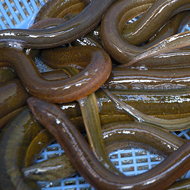Further pressure on endangered eels

Illegal trade in European eels is most serious wildlife crime facing EU
Fishing for young European eels (Anguilla anguilla) – so-called ‘glass eels’ – is permitted in European waters at certain times of the year. The exact dates vary by country but usually run sometime between November and May the following year. Glass eels are then traded for farming, restocking or consumption within the European Union (EU).
Wildlife trade monitoring network, TRAFFIC, is warning of a surge in international glass eel smuggling cases and urges enforcement authorities to maintain their vigilance and ensure those catching eels are doing so legally.
The European eel is considered Critically Endangered on the IUCN Red List and their international commercial trade to or from the EU was stopped in December 2010 after the EU concluded it was too risky to allow it to continue and imposed a zero-import/export policy, which still remains in place.
Despite these measures, according to Europol, during the 2018 to 2019 fishing season, some 5,789 kg of European eels illegally in trade were seized and 154 suspected smugglers arrested. The glass eels are taken to Asia where they are grown into adults for human consumption. Just last month, authorities in France seized 90kg of glass eels at Paris-Charles De Gaulle airport en route from south-west France to China.
Illegal trade in European Eels, particularly glass eels, is the most serious wildlife crime issue the EU currently faces. Hiromi Shiraishi, TRAFFIC’s eel trade expert, says: “Traffickers exploited the last fishing season as an opportunity to smuggle glass eels to lucrative Asian markets … European eel populations simply cannot withstand the sustained illegal offtake.”
Illegal trade in eel meat is also a concern. Following the illegal export of glass eels to Asia and their growing out in farms, European eel meat could be imported into the EU and other markets, falsely declared as other species of eel.
At the 18th meeting of the Conference of the Parties to CITES last August, European eel range states were asked to develop and implement measures to improve the traceability of eels in trade. “The development of a harmonised European-wide traceability system for European eel is a prerequisite to ensuring eel trade is kept on the straight and narrow,” said Shiraishi.



 The latest
The latest